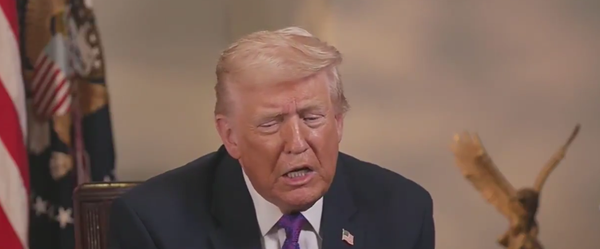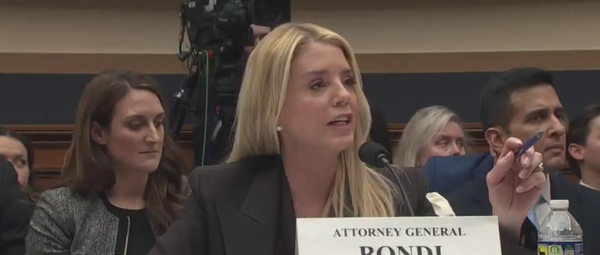Why Doesn't Anyone Believe Donald Trump? Because He was Impeached
Impeachment was the end of his supply of benefit-of-the-doubt.

Political scientists are weighing in after the president ordered last week a missile strike that killed Iran’s second most influential political figure, Qassem Soleimani. The presumption is Donald Trump believes escalating conflict abroad will lift pressure at home or aid reelection. Michael Tesler said Saturday in the Post this is called the “rally effect.” The UC Irvine professor also said the president is getting everything wrong.
The approval ratings of Presidents George H.W. Bush and George W. Bush immediately surged after their respective military interventions against Iraq. Trump seemed to literally want Americans to rally around the flag when he tweeted a picture of the American flag soon after Soleimani’s demise.
But not all military crises trigger rally effects.
Political science research shows that rally effects are most likely to occur when there is bipartisan support among political elites for the president’s actions.
Bloomberg’s Jonathan Bernstein concurred this morning. “If Trump is seeking a confrontation to help him win reelection, he’s almost certainly making a big mistake,” he said. “[That’s] more or less the consensus among political scientists—contrary … to the “Wag the Dog” assumptions in the popular culture about the popularity of war.”
After three years of lies and a perennial fog of illegitimacy, there’s little chance of Trump being taken seriously about something as serious as war.
Others presume Trump is escalating conflict abroad to boost support at home. Elizabeth Warren spent a good deal of time Sunday on Meet the Press asking why the president decided now was the time to strike. “We are not safer because Donald Trump had Soleimani killed. We are much closer to the edge of war. The question is: Why now? Why not a month ago? Why not a month from now?” She answered her own question: “Trump faces the start potentially of an impeachment trial. … Why now?"
Rukmini Callimachi, who covers Al Qaeda and ISIS for the Times, wondered the same. Soleimani was well known for mass murder by proxy. The US government knew where he was. Presidents George W. Bush and Barack Obama decided against targeting Soleimani. His death would have been too inflammatory. In this context, Callimachi tweeted Saturday, “it’s hard to decouple his killing from the impeachment saga.”
The most prominent neutral skeptic was Jake Tapper. The host of CNN’s State of the Union cast doubt on Mike Pompeo’s claim killing Soleimani prevented an imminent attack on Americans. (Callimachi said she was told the intelligence behind that claim was “razor thin.”) This government has said so many things “that were not true,” Tapper said. “Do you understand that there might be a special responsibility to provide proof and evidence to the American people of the imminence of this attack?"
Perhaps the president’s greatest critic is Donald Trump. In the fall of 2011, Trump said the following of Barack Obama: “Our president will start a war with Iran, because he has absolutely no ability to negotiate. He’s weak and he’s ineffective. We have a real problem in the White House. So I believe that he will attack Iran sometime prior to the election, because he thinks that’s the only way he can get elected. Isn’t it pathetic?”
Yes, it is.
Let’s take a step back to note a few points. First, when Trump accuses people of wrongdoing, that’s the most reliable indicator of what he is doing or planning to do. The only time we know this president is telling the truth is when he’s projecting.
Second, the president is no longer getting the immediate benefit of the doubt even from a Washington press corps habituated to giving all presidents an endless supply of benefit-of-the-doubt. Telling more than 13,000 lies or falsehoods since taking office, according to the Post, will do that. As CNN’s Daniel Dale wrote, telling gigantic whoppers—“deliberate, significant attempts to deceive and manipulate”—will do that.
The press corps might have been more credulous back in May when Trump first considered targeting Soleimani. That, however, was before we knew he involved Ukraine’s president in an international conspiracy to defraud the American people.
But more than lies are at work. We are seeing, I think, a material consequence of impeachment. Being indicted by the House of Representatives for abuse of power and obstruction, and thus violating the public trust, has resulted in a new depth of distrust. The press corps might have been more credulous back in May when Trump first considered targeting Soleimani. That, however, was before we knew he involved Ukraine’s president in an international conspiracy to defraud the American people. That was before the impeachment inquiry made a majority of Americans more aware of the fact that the Ukraine conspiracy was not the first time Donald Trump cheated.
When Dick Cheney said Iraqis would welcome Americans as liberators, that seemed plausible to many people at the time. Nearly everyone in the run-up to the 2003 invasion was willing to give President Bush the benefit of the doubt. (That changed later on, of course, when the occupation soured and it was known the Bush administration lied to the American people to justify invasion.) When Mike Pompeo said the same thing last week about Iranians, his statement was met with howls of laughter. After three years of lies and a perennial fog of illegitimacy, there’s little chance of Trump being taken seriously about something as significant as war.
Which leads me to my final point.
The president is proving the Democrats were right.
—John Stoehr




